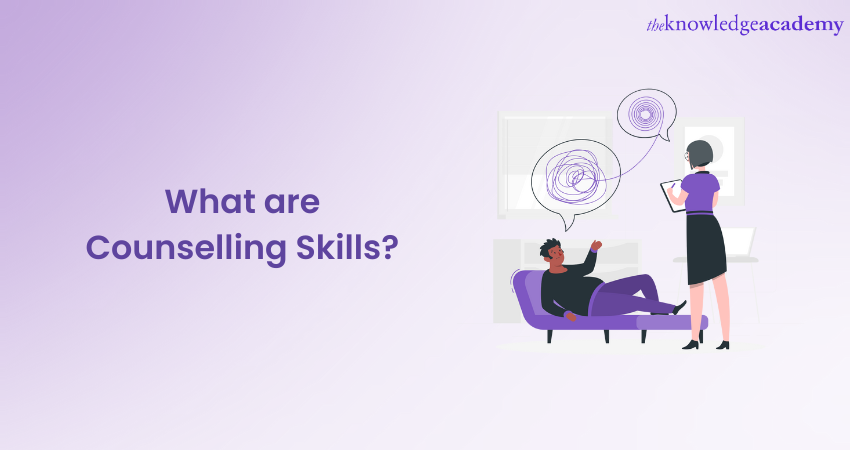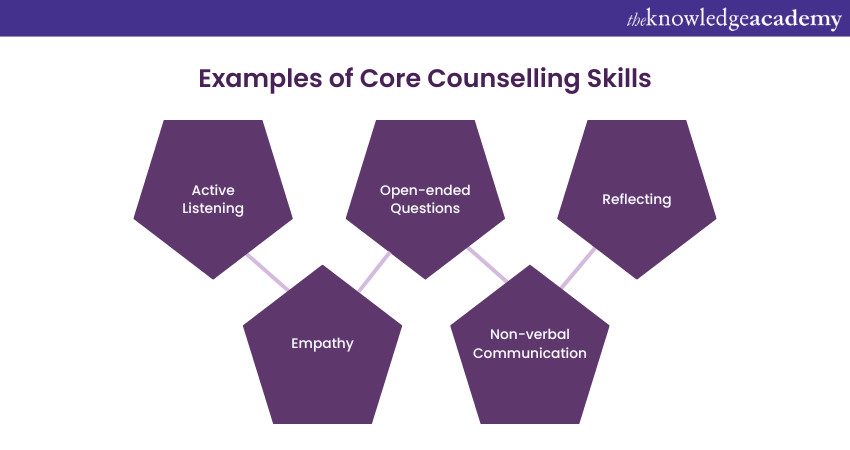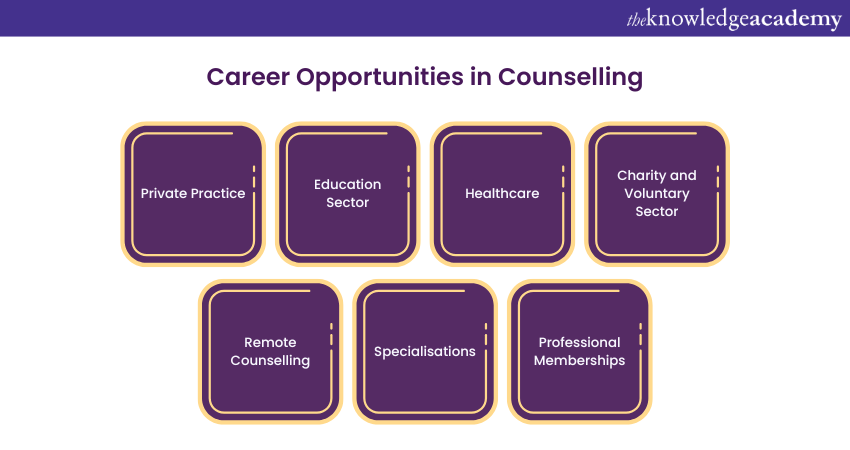We may not have the course you’re looking for. If you enquire or give us a call on 01344203999 and speak to our training experts, we may still be able to help with your training requirements.
We ensure quality, budget-alignment, and timely delivery by our expert instructors.

Ever wondered what sets a great Counsellor apart in their ability to help others? The secret lies in mastering Counselling Skills—essential tools that build understanding, trust, and meaningful conversations. These skills aren't just for professional counsellors; they're invaluable for anyone looking to support others effectively.
This blog explores what Counselling Skills are and how you can enhance them. Whether you're just beginning or aiming to grow, these insights will help you connect better and make a real difference. Let's dive in and discover the key aspects of becoming more effective at supporting others!
Table of Contents
1) What are Core Counselling Skills?
2) Examples of Counselling Skills
3) How to Improve Your Counselling Skills?
4) Career Opportunities in Counselling
5) Conclusion
What are Core Counselling Skills?
Core Counselling Skills are fundamental tools that enable a Counsellor to effectively understand and support individuals. These skills include active listening, where the counsellor gives their full attention to the speaker, and empathy, which involves understanding and sharing the speaker's feelings. Another crucial skill is asking open-ended questions to encourage the individual to discuss their thoughts and feelings more deeply.
Counsellors, particularly those practising Counselling Psychology, also use reflection to demonstrate their understanding by summarising or paraphrasing what the individual has said. Finally, they create a safe and non-judgmental environment, allowing the individual to feel comfortable and open up.
Examples of Core Counselling Skills
Core Counselling Skills are fundamental tools utilised by Therapists and Counsellors during their sessions. However, these skills extend far beyond the therapy room. They can be used in day-to-day interactions, helping to promote improved communication and understanding. Let's delve a bit deeper into each of these Counselling Skills for:

Active Listening
Active listening goes beyond simply hearing the words that someone is saying. It involves paying close attention to the speaker's words and body language and reading between the lines to understand the emotions, thoughts, and feelings that they're expressing.
Active Listening is one of the basic Counselling Skills. It includes responding to the speaker in a way that validates their feelings and encourages further conversation. It's about fully immersing yourself in the conversation and focusing on understanding the speaker's perspective.
Empathy
Empathy is the process of putting yourself in the other person's shoes to truly understand and appreciate their emotions and experiences. It requires sensitivity and a willingness to connect with someone else's emotional world. Empathy involves recognising and reflecting back the feelings of the person you're interacting with.
It allows Counsellors to build a strong bond of trust and understanding with their clients, promoting a safe and supportive environment for them to express themselves.
Open-ended Questions
Open-ended questions are inquiries that cannot be answered with a simple "yes" or "no." These questions can encourage the speaker to provide more detail and elaborate on their thoughts and feelings.
They facilitate deep exploration and help the person to gain insights about their experiences and emotions. Open-ended questions, such as "Can you tell me more about that?" or "How did that make you feel?" opens avenues for rich and meaningful conversations.
Keen on getting a deeper knowledge about counseelling, refer to our blog on Counselling vs Therapy
Non-verbal Communication
Non-verbal communication includes facial expressions, body language, and tone of voice. It's an essential skill for Counsellors because it helps them to understand and interpret the unsaid feelings or emotions of their clients. Paying attention to these non-verbal cues can provide insights into a person's emotional state and enhance the effectiveness of the communication process.
Reflecting
Reflecting is a skill that involves summarising or paraphrasing the speaker's words to show understanding and encourage further explanation. It shows the speaker that you're fully engaged and interested in what they have to say. This skill helps in validating the person's feelings, ensuring they feel heard and understood.
Understand the methods of giving social support with our Psychology Course – Join today!
How to Improve Your Counselling Skills?
Improving your Counselling Skills can greatly enhance both your professional and personal life. The following strategies can help improve your skills in Counselling:

Self-awareness
Self-awareness lays the foundation for effective Counselling Skills. Cultivate self-awareness by reflecting on your own emotions, thoughts, and behaviours. This can help you understand yourself better and increase your ability to empathise with others.
You can develop self-awareness through mindfulness exercises, journaling, or seeking feedback from others. It's about deepening the understanding of your reactions and biases and striving for continuous growth and development.
Enhance Your Listening skills
Listening forms the cornerstone of successful communication. Try to engage in Active listening in your day-to-day life. When someone is speaking to you, focus on what they're saying, show that you're paying attention through your body language, and respond appropriately to validate their feelings. Practising this in daily conversations can significantly enhance your Active Listening skills over time.
Ask Open-ended Questions
Open-ended questions are key to facilitating deeper conversations. Get into the habit of asking such questions in your interactions. Instead of questions that elicit a simple yes or no, frame your questions to encourage the other person to share their experiences, feelings, and thoughts more freely.
Develop Empathy
Empathy allows us to connect with people on a profound level. Try to regularly put yourself in other people's shoes to understand their perspective. This may involve active imagination or recall of similar personal experiences. Over time, this practice can help you naturally empathise with others during interactions.
Take Professional Development Courses
Ongoing learning is essential for improving your Counselling Skills and understanding the Ethical Framework in Counselling. There are many courses available, both online and in-person, to help you develop these skills. Choose courses that include practical, hands-on learning, as this will provide valuable experience and real-world insights into applying Counselling Skills effectively while adhering to ethical guidelines.
Practice Non-verbal Communication
The majority of our communication is non-verbal, conveyed using tone of voice, body language, and facial expressions. Work on improving your ability to read and respond to these subtle cues. This might involve mindful observation of people in various social contexts or studying resources on body language.
Seek Feedback
Constructive criticism can be invaluable for improvement. Regularly ask for feedback from peers, supervisors, or mentors about your Counselling Skills. This feedback can provide you with objective insights into areas that need improvement.
Regular Self-reflection
Engaging in regular self-reflection will help you grow in Counselling Skills at a faster rate. It means, at the end of each Counselling session or a meaningful subsession or interaction, one has to make time and do a ‘pause-reflection.’ Reflection enables one to discover the strengths that need enhancement and how to go about it. For a deeper understanding of this process, you can refer to the 7 Stages of Counselling Process PDF, which provides detailed insights into how to integrate reflection and continual improvement into your counselling practice.
Learn anxiety management strategies with our Anxiety Course – Join today!
Career Opportunities in Counselling
There are many diverse career opportunities available in the field of Counselling. They are only going to expand as mental health gains importance in various sectors. Let’s take a look at some of them below:

1) Private Practice: Many qualified Counsellors establish their own private practices, offering Counselling services to clients. This often involves a combination of running a private practice and part-time work to gain experience. Building a successful practice usually requires many years of experience.
2) Education Sector: Counsellors can find employment in educational institutions, including schools, colleges, and universities. In these settings, they provide support to students, helping them address both academic and personal issues.
3) Healthcare: There are many opportunities available in the healthcare sector. However, National Health Service (NHS) positions may be limited. Counsellors can work in hospitals, General Practitioner (GP) surgeries, or within community and occupational healthcare teams. They assist clients in dealing with a range of health-related problems.
4) Charity and Voluntary Sector: The charity and voluntary sector offer a wide range of career options for Counsellors. They can work for organisations focusing on mental health, homelessness, domestic violence, adoption, offender rehabilitation, and family relationships.
5) Remote Counselling: With the advent of technology, Counsellors have the option to work remotely, offering Counselling services online or via telephone. Additionally, alternative approaches like equine therapy and walk-and-talk therapy are gaining popularity, providing opportunities to work outdoors.
6) Specialisations: Counsellors may choose to specialise in specific areas, such as couples Counselling, family therapy, play therapy, art or music therapy, or focus on issues like trauma, grief, or eating disorders. Specialisations often develop based on personal interests and experiences.
7) Professional Memberships: Membership in a professional governing body is important in your career. This includes bodies such as British Association for Counselling and Psychotherapy (BABCP), the National Counselling Society (NCS), the UK Council for Psychotherapy (UKCP). Therefore, joining any one of these will let a member demonstrate good professional standard.
Conclusion
Mastering Counselling Skills is a journey that can significantly enhance your ability to support and connect with others. Understanding the various Types of Counselling can help you tailor your approach to meet diverse needs. Whether you're a professional Counsellor or someone who simply wants to be there for friends and family, these skills are invaluable. By understanding and improving these key aspects, you can foster deeper relationships and make a meaningful impact. So, take the first step today and start honing your Counselling Skills—your efforts will surely make a difference!
Learn how to possess an attitude of respect with our Counselling Course – Join today!
Frequently Asked Questions
What are the Qualities of a Good Counsellor?

A good Counsellor is empathetic, patient, and a great listener. They create a safe, non-judgmental space where clients feel supported and understood.
How do Clients Avoid Painful Agendas in Counselling?

Clients may avoid painful topics by redirecting conversations or focusing on less emotional issues. A Skilled Counsellor gently encourages them to explore these areas at their own pace.
What are the Other Resources and Offers Provided by The Knowledge Academy?

The Knowledge Academy takes global learning to new heights, offering over 3,000 online courses across 490+ locations in 190+ countries. This expansive reach ensures accessibility and convenience for learners worldwide.
Alongside our diverse Online Course Catalogue, encompassing 19 major categories, we go the extra mile by providing a plethora of free educational Online Resources like News updates, Blogs, videos, webinars, and interview questions. Tailoring learning experiences further, professionals can maximise value with customisable Course Bundles of TKA.
What is The Knowledge Pass, and How Does it Work?

The Knowledge Academy’s Knowledge Pass, a prepaid voucher, adds another layer of flexibility, allowing course bookings over a 12-month period. Join us on a journey where education knows no bounds.
What are Related Courses and Blogs Provided by The Knowledge Academy?

The Knowledge Academy offers various Mental Health Courses, including the Mental Health and Wellbeing Course, Counselling Course, and Anxiety Course. These courses cater to different skill levels, providing comprehensive insights into Social Anxiety Disorder.
Our Health & Safety Blogs cover a range of topics related to Counselling, offering valuable resources, best practices, and industry insights. Whether you are a beginner or looking to advance your Counselling Skills, The Knowledge Academy's diverse courses and informative blogs have got you covered.
Upcoming Health & Safety Resources Batches & Dates
Date
 Counselling Masterclass
Counselling Masterclass
Fri 6th Jun 2025
Fri 8th Aug 2025
Fri 3rd Oct 2025
Fri 5th Dec 2025






 Top Rated Course
Top Rated Course



 If you wish to make any changes to your course, please
If you wish to make any changes to your course, please


